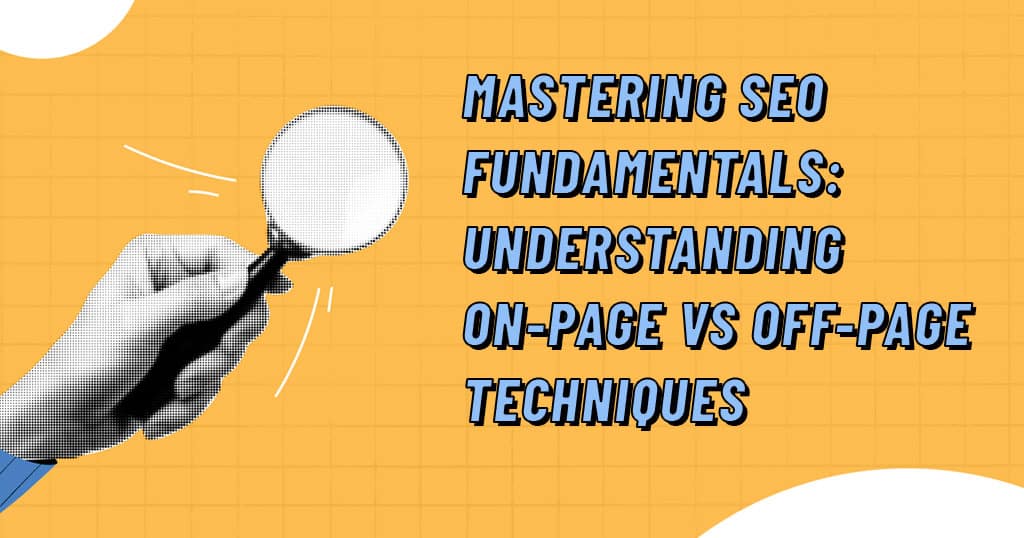Introduction to SEO: The Basics
Since the early days of the Internet, Search Engine Optimization (SEO) has been a fundamental digital marketing strategy for businesses. The role of SEO is to help organisations increase their online presence, attract new visitors, spread information effectively, and enhance business growth.
In the initial days, SEO was more of overemphasising keywords and accumulating backlinks without context. Today, it is considered a sophisticated strategy that is focused on understanding and responding to user behaviour on the internet. Modern SEO integrates both on-page and off-page strategies to ensure that high-quality websites rank higher and climb to the top of the search engine results.
So, what exactly do you mean by on-page and off-page SEO? How can digital marketers leverage these SEO techniques to benefit their companies or clients? Stay tuned to gain a comprehensive understanding of SEO and learn more about On-Page vs. Off-Page SEO Techniques.
On-Page vs. Off-Page SEO Techniques.
On-page SEO and Off-page SEO are integral components of search engine optimisation, each targeting distinct aspects to enhance a website’s visibility on search engine results pages (SERPs). On-page SEO and Off-page SEO are crucial elements of a comprehensive SEO strategy. They both work in synergy to help optimise a website’s online visibility and effectiveness in reaching its target audience.
What is On-Page SEO?
On-page SEO focuses on refining and improvising the content and structure of individual web pages. It includes keyword optimization, adding meta tags, headers, and internal links to improve relevance and user experience directly on the website.
What is Off-Page SEO?
Off-page SEO focuses on boosting a website’s authority, credibility, and relationships with external entities. It can be achieved using strategies like link building, social media engagement, and online reputation management. These strategies help enhance the site’s overall online presence and search engine ranking.
Understanding On-Page SEO
On-page SEO involves the strategic optimisation of individual web pages to boost their search engine rankings and attract organic traffic. It revolves around enhancing the content and structure of a website through various key elements:
- Keyword Optimization: Comprehensive keyword research helps in identifying relevant terms. Strategically integrating these keywords into page titles, headings, meta descriptions, and content helps search engines understand the webpage’s theme and enhances its visibility for relevant search queries.
- High-Quality Content: Creating high-quality, relevant, and engaging content that delivers substantial value to users is crucial. Well-written articles, blog posts, and landing pages help enhance user experience and prolong page visits, thereby decreasing bounce rates.
- User Experience (UX) Design: Prioritizing a user-friendly, intuitive website design that facilitates easy navigation is essential. Optimizing factors such as page load speed, mobile responsiveness, and overall usability significantly contributes to improved search engine rankings and minimised bounce rates.
- Title Tags and Meta Descriptions: Developing enticing and informative title tags and meta descriptions is essential. These elements appear in search engine results and play a critical role in influencing click-through rates by accurately summarizing the content of the page.
- Internal Linking: Strategically linking related pages within the website enhances navigation and distributes link equity effectively. Internal links aid search engines in discovering and indexing content more efficiently, contributing to improved overall SEO performance.
Understanding Off-Page SEO
Off-page SEO encompasses strategies aimed at boosting a website’s search engine rankings and authority through external factors beyond the website itself. These techniques primarily concentrate on bolstering the website’s reputation and credibility. Key aspects of off-page optimization include:
- Link Building: This involves acquiring high-quality backlinks from respected and authoritative websites. Backlinks act as endorsements or “votes of confidence,” signalling to search engines that the website provides valuable content.
- Social Media Engagement: Actively engaging on social media platforms to promote content, interact with users, and increase brand visibility. Social media interactions, including likes, shares, and comments, help enhance brand authority and indirectly impact search engine rankings.
- Online Reputation Management (ORM): Monitoring and overseeing online reviews, ratings, and mentions of the brand or website. A positive online reputation helps foster trust and credibility, influencing how the website is perceived by both users and search engines.
- Influencer Outreach: Partnering with influencers or industry thought leaders to expand brand reach and increase visibility. Influencers can assist in securing backlinks and endorsing the website, thereby enhancing its authority and credibility.
- Guest Blogging: Contributing well-crafted articles to respected websites within the same industry or niche. Guest blogging facilitates exposure to new audiences and fosters valuable backlinks, benefiting the website’s SEO efforts.
On-Page and Off-Page SEO Synergy
On-page and off-page SEO work cohesively to boost a website’s search engine rankings. On-page optimisation establishes a robust foundation by ensuring the website is technically sound, user-friendly, and enriched with high-quality content. Meanwhile, off-page optimisation focuses on cultivating external signals of authority and relevance.
In the world of SEO, on-page and off-page optimisation are foundational pillars that significantly impact a website’s visibility and success in search engine rankings. On-page SEO works on refining the content, improving user experience and addressing technical aspects directly within the website. At the same time, off-page SEO revolves around cultivating external signals of authority and credibility, such as backlinks and social proof.
To achieve optimal results, it’s ideal to adopt a comprehensive SEO strategy that integrates both on-page and off-page techniques. By harnessing the strengths of each approach, website owners and digital marketers can effectively boost online visibility, drive organic traffic, and ultimately secure higher rankings in search engine results. This synergy helps enhance the site’s overall performance and strengthen its authority in the competitive digital landscape.

